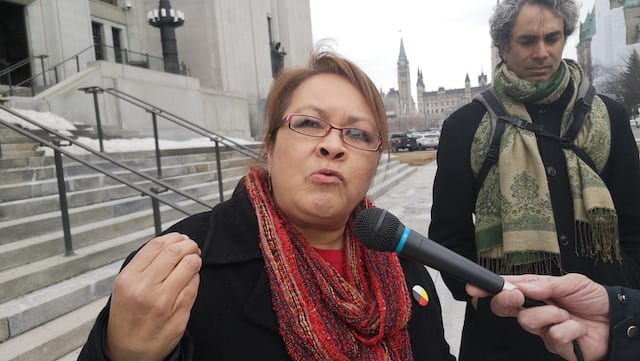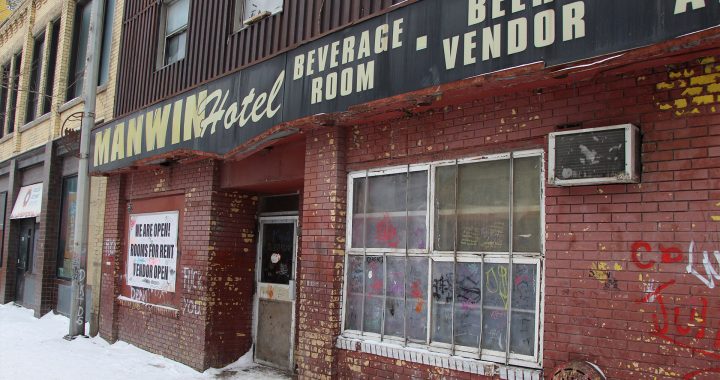
Jocelyn Iahtail. Photo: Justin Brake/APTN.
When Jocelyn Iahtail tried to deliver a copy of the United Nations Declaration on the Rights of Indigenous Peoples to the Supreme Court of Canada Thursday, she couldn’t get through the front door.
So she stood outside and delivered her message for Canada’s highest court to the lone RCMP officer blocking her entry to the building.
“I’m here to gift you with the UNDRIP (United Nations Declaration on the Rights of Indigenous Peoples) on behalf of all of us, because you and I are here as treaty people,” she told the officer.
Iahtail, a Cree woman from Attawapiskat who now lives in Ottawa, joined about two dozen others on Thursday for a bus tour around the capital city to deliver copies of the U.N. Declaration to federal government buildings and to call on the Senate of Canada to pass Bill C-262 before Parliament’s summer break.
She said residential and day schools, the Sixties Scoop, millennium scoop, missing and murdered Indigenous women, men, girls and boys, and the ongoing child welfare crisis are all part of a more than 500-year-old “holistic genocide” by settlers against Indigenous peoples.
And she believes Cree MP Romeo Saganash’s private members’ bill, C-262, An Act to ensure that the laws of Canada are in harmony with the United Nations Declaration on the Rights of Indigenous Peoples, is an important part of ending the colonial violence and achieving justice for Indigenous people in Canada.
Jocelyn Iahtail of Attawapiskat delivers a copy of #UNDRIP to the Supreme Court of Canada. She’s part of a group that visited federal buildings in Ottawa Thursday calling for ‘s swift passage of ‘s #BillC262. pic.twitter.com/mckhXgt4Ml
— Justin Brake () March 21, 2019
Saganash, the NDP’s critic for reconciliation, introduced C-262 in the House of Commons in April 2016.
Three years later, the bill has passed three readings in the legislature and is now in the midst of its second reading in the senate.
The bill has to go to senate committee before its third reading and before it can receive royal assent.
Supporters of the legislation are nervous it may not pass before the end of June, when senate will break for the summer and parliament will be suspended for the fall federal election.
At that point, any legislation that has been introduced but not passed would be scrapped and only given new life if it were reintroduced again in Parliament.
On Thursday, for their final stop, Iahtail and her group visited the Senate building down the street from Parliament Hill.
While delivering their message they met Quebec Senator Julie Miville-Dechêne, who told them she will be voting for C-262 once it has passed the committee stage.
The former Radio-Canada journalist said the “reconciliation process is much, much larger than this bill, but [C-262 is] a step.
“As senators we are there to renew the laws, to change them when we feel we have to,” she said, explaining senators know they have a deadline by which to ensure the UNDRIP bill is passed.
Iahtail said Saganash’s bill will help end racial discrimination against Indigenous peoples in Canada.
“That’s racial discrimination, when you don’t recognize our original lands, our original language, our original laws that are inherent in our language. Our original spirituality, our original governance, our original ways of knowing, thinking, living and being.”
UNDRIP, among other things, says Indigenous peoples “have the right to self-determination,” and that “by virtue of that right they freely determine their political status and freely pursue their economic, social and cultural development.”
The Declaration, adopted by the United Nations’ General Assembly in 2007, is regarded as an expression of the minimum human rights standards by which states must respect Indigenous peoples.
Canada was one of only four countries to initially withhold its support for the declaration.
Then, in 2010, the Stephen Harper-led Conservative government endorsed UNDRIP, but after calling it an “aspirational document” in their throne speech earlier that year.

Quebec Senator Julie Miville-Dechêne told demonstrators Thursday outside the Senate Building she will vote in support of Bill C-262. Facebook photo.
In December 2015 the Truth and Reconciliation Commission called on federal, provincial, territorial and municipal governments “to fully adopt and implement the United Nations Declaration on the Rights of Indigenous Peoples as the framework for reconciliation,” in its calls to action.
In May 2016, Crown-Indigenous Relations Minister Carolyn Bennett announced at the U.N. in New York Canada’s “unqualified support” for UNDRIP.
Almost three years later, C-262 is on the cusp of changing how Indigenous rights are recognized and implemented in Canada, many say.
Last week the Union of B.C. Indian Chiefs (UBCIC) published an open letter to all senators, saying the legislation “must not be stalled in the Senate.
“With a looming federal election, there is a substantial and unacceptable risk that the bill may miss the legislative window,” the UBCIC executive wrote.
“Canada has delayed the implementation and recognition of the international human rights standards of Indigenous peoples for far too long.
“The UBCIC is calling on the Senate of Canada to immediately pass Bill C-262 and to begin the initial work of implementing the UN Declaration, the most comprehensive, universal international human rights instrument explicitly addressing the economic, social, cultural, political, spiritual and environmental rights of Indigenous Peoples.”










